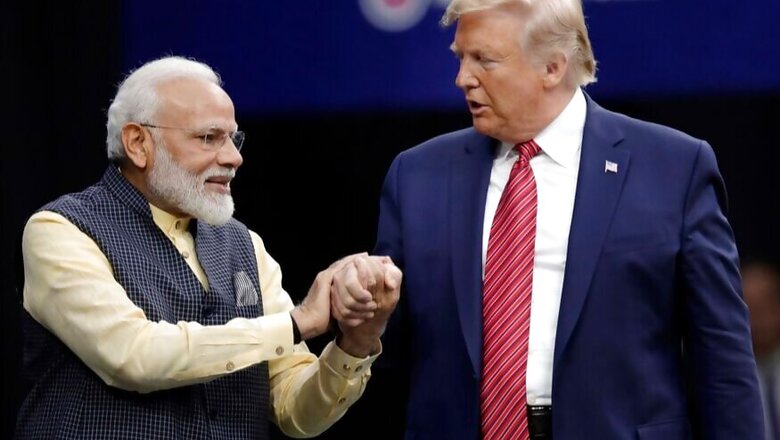
views
The synergistic effect of “the leaders of the world's two largest democracies” sharing a stage turned the diaspora rally in Houston, Texas, into a potent political spectacle. Beamed to a billion homes worldwide, 'Howdy, Modi' has put Indo-US relations in the global spotlight, to the mutual advantage of both countries.
President Donald Trump’s emphasis on a “strong security partnership” and mutual commitment to fight “radical Islamic terror” and safeguard respective borders will have been intently watched and minutely analysed in Beijing and Islamabad. Washington has taken a tough stance on China, while India has successfully resisted Pakistan's attempts to internationalise Kashmir.
The Indian Prime Minister strongly defended the abrogation of article 370 and took a potshot at Pakistan for fomenting terror, simultaneously lauding Trump's stance against terrorism. He hinted, thereby, that the US is on the same page as India on the issue.
Trump's very presence at the event had a multiplier effect in terms of impact. Conversely, PM Modi’s rockstar status among Indian-Americans, affirmed by the crackling enthusiasm and energy at the NSG Stadium in Houston, may well rub off on Trump.
PM Modi noted that POTUS had broken tradition to attend a diaspora rally for a foreign head of state on American soil (the fact that he turned up late may have cost him a few brownie points). As Modi said, it was 'unprecedented' and 'extraordinary'.
His fulsome praise of India's “true friend in the White House” and reiteration of “Abki Baar Trump Sarkar” will not have been lost on the four million PIOs in the US, most of whom voted for Hillary Clinton in 2016. The Republicans could do with a “Modi-booster” in the swing state of Texas, where the diaspora is 500,000-strong and relatively prosperous.
Trump reached out to the Indian-American community, lauding their contribution to the country and making it clear that his anti-immigrant rhetoric applies only to those who come across the border illegally.
The event itself was bipartisan, with representatives from both parties present. House Majority leader Steny Hoyer (Democrat) made it a point to underscore the bipartisan nature of the US relationship with India.
PM Modi's intuitive mastery of symbolic gestures had him winning hearts from the outset of his visit, as he bent to pick up a fallen flower from the red carpet at Houston airport, consoled an over-emotional Kashmiri pundit NRI, cuddled an Indian-American kid and schmoozed with CEOs of energy majors, before receiving the key to Houston at what was the largest-ever gathering addressed by a foreign dignitary on US soil.
Modi took the opportunity to harp on India's continuing economic growth and improved governance through leveraging digital technology, at a time when the country's slowing economy has evoked concern. Trump, likewise, emphasised the strength of the US economy, deflecting attention from the uncertainty regarding a US-China trade deal.
The planned protests against both Modi and Trump by separatist and human rights groups were reduced to a tiny footnote, overshadowed by the main event of the day. Emboldened by severe criticism of the event by US politician Bernie Sanders in a Houston daily, the protesters gathered outside the NRG Stadium, but were held at bay by police barricades.
Given the euphoria at the NSG stadium, the fact that the much-anticipated 'mini' trade deal is obviously still in the works didn't seem to matter. For his part, President Trump made no secret of his desire for greater market access to India, specifically referring to energy and defence exports.
The body language between the two leaders argued warmth and affability in consonance with the mutual admiration expressed in their speeches. They were comfortable, holding hands and putting an arm around each other's shoulders. Trump hinted he might come to India soon and the PM issued an invitation on the spot.
All in all, coming together in the Lone Star state has proved to be a 'Trump' card for both.


















Comments
0 comment